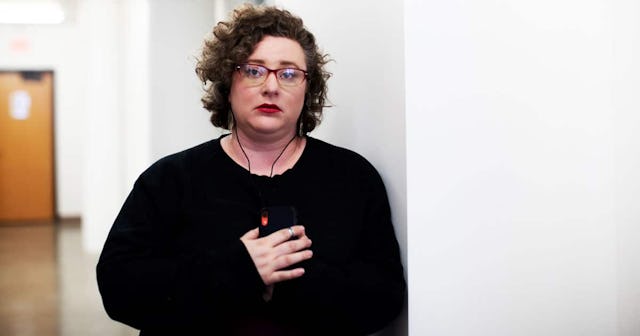I Have Child Loss PTSD And No One Wants To Talk About It

Trigger warning: child loss/PTSD
I recently wrote an article about a viral meme that kept popping up on my newsfeed and was steadily triggering my PTSD as a bereaved mother. I didn’t (and still don’t) expect everyone to understand what it’s like for this stress disorder to be “tripped up,” especially by something as silly as a meme, but I was hopeful that by being raw, transparent, and somewhat vulnerable in my struggle, others would be receptive and understanding.
Sadly, I couldn’t have been more wrong. I hardly ever read the comments, but this time, due to my misguided expectation from others, I regretfully did. Without ever having lived through my trauma, only reading my very real account of it (a mere portion of it too, mind you), people were off-the-bat dismissive and argumentative toward my pain.
“I’m sorry for your loss, BUT…”
“Sounds like you need to work on your PTSD.” (Thanks for this, Captain Obvious.)
“You can’t be offended about everything, this isn’t offensive.”
As someone who has lost a child, speaking to someone who has not, I’m far enough into this road that I know other people can’t decide what hurts me and what doesn’t. I don’t get to pick what brings my horrible symptoms, when I get them, or what triggers them, so certainly some stranger with zero experience on the matter can’t either.
kaipong/Getty
To me, the meme wasn’t so much offensive as it was painful. It was too close to home, and it was triggering for weeks. It was my deepest trauma being made light of. And the comments from others, which disputed my pain, only intensified my feelings that this mental illness — PTSD — is poorly misunderstood.
The stigma surrounding many mental illnesses has been changing lately. Depression, anxiety, and OCD are not hidden and cloaked in shame to the same extent they once were. Thanks to the bravery of many, these mental illnesses are being seen for what they actually are — illnesses.
But from my own experience, I’ve seen some exceptions. One of them being PTSD stemming from the loss of a loved one.
Unlike most coverage and advocacy surrounding PTSD, my disorder isn’t rooted in a history of past-sexual abuse. I don’t have it from caring for premature babies in the NICU. And I’ve never been in a catastrophic-enough accident to do long-lasting damage to my mental health.
These are all valid traumas which can cause PTSD in individuals. And even though I can relate to the symptoms, I cannot relate to the trauma… because it was never my trauma. My trauma is fueled by the memory of my daughter’s death and the many days following that dreadful morning.
But sadly, the root of my pain and mental illness isn’t one we are ready to discuss, because my PTSD stems from something we all fear. Our society has, maybe unknowingly, looked away from people like me, because our natural instinct puts us off to anything that deals with death or dying. Inwardly, we are terrified of it. So we ostracize those who have been up close and personal with it.
Klaus Vedfelt/Getty
This struggle often goes unseen and shrugged off, because the hurt is so misunderstood. And make no mistake, it is isolating.
I don’t make a point to banter on about my struggle with PTSD in day-to-day interactions. For one, that’d be uncomfortable for not only me, but everyone else. For two, it is my most daunting struggle and I don’t always feel up to discussing it. But when space is made in conversation for me to share, and it somehow does come up, I can feel the discomfort, misunderstanding, and occasional disbelief from those in the room. And, maybe without meaning to, I’m made to feel small, off my rocker, and like the outcast standing in the room.
The reaction from others makes me want to scream. I want to ask why we feel so comfortable discussing many other mental illnesses, but we can’t touch on the one that cripples me, and millions of Americans, the most? I long to tell others how normal my PTSD is from the trauma I experienced, and I don’t know how anybody could not have this disorder for some lapse of time if their child died too.
But I can’t, because I’m usually not given the time of day. People are so fearful of this type of trauma, and I can’t say I don’t get it, because I do. But now that I’m here, I wish people understood me too. This is something I live with, but my life doesn’t revolve around it.
I know the root cause of my PTSD is unfixable, but my symptoms are treatable. This illness isn’t contagious, and it is not the ice-breaker to my every single conversation.
My PTSD isn’t scary, and it certainly isn’t “crazy.” It’s just a mental illness.
This article was originally published on